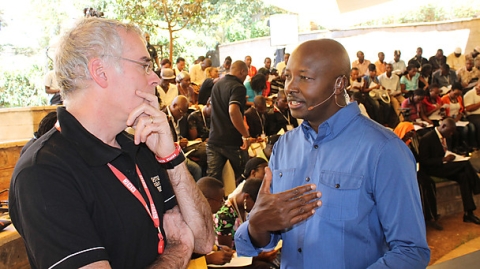
Knight Fellow Joseph Warungu (right) moderated one of the first-ever live debates among presidential candidates in Kenya, in advance of the March 4 election. Photo: Peter Horrocks, BBC Global News.
Election campaigns in Kenya are normally noisy, lively and bloody. But this one had a difference. Instead of the usual three or four presidential candidates, there’ve been eight. There’s also been less bloodshed, but certainly more money spent in wooing the voter.
And for the first time ever, all candidates seeking the keys to State House – seven men and one woman – appeared together in public debates. There were three in February, broadcast live on radio and TV and streamed on the Internet.
I chaired the second debate, organized by mainstream Christian churches as a platform where leaders could address issues from a moral and ethical perspective. The debate took place in front of a live audience of nearly 2,000 and was broadcast on 12 radio and TV stations.
A quick look at daily newspaper headlines will tell you that Kenyans are obsessed with politics. Who is cutting a deal with whom, who is undercutting who, and who’s fallen out of favor, are regular topics of discussion. However, during the presidential debates – and in most of the campaign – real issues took to the stage.
Land has emerged as the single most important issue in this campaign. The political violence that followed the disputed elections of 2007 had the effect of displacing hundreds of thousands of people from their land. Five years on, many are yet to return to their homes. Indeed, the liberation war against the British colonial authorities in Kenya in the 1950s was centered on land.
In a society where owning ‘my portion of soil’ is like a badge of honor, land is something and everything. Not surprisingly, most of the political parties have gone to great lengths in their manifestos to explain how they will address historical injustices regarding land.
Although Kenya is considered one of the most advanced nations in Africa and has a fairly well-developed agricultural sector that brings in a substantial income from exports, the country is not food secure and many people still depend on food aid. Perennial drought, which is becoming a regular feature and is attributed to changing weather patterns, has left an estimated 2.1 million people still in crisis and requiring assistance in order to meet their basic needs.
During the debates, and in media coverage, some of the presidential candidates have been taken to task over their land reform policies and the excessive tracts of land they own. Indeed, during the debate I chaired, I pressed candidates on whether they would allow the new National Land Commission, which is tasked with reviewing and resolving the mess over land, the freedom to operate without interference from the executive. If land issues are not resolved, Kenya will never be fully at peace.
When the country went up in flames following the controversial elections of 2007, the media were heavily censured for stoking the fire, or at the very least not doing enough to calm down the tensions. By the time dust had settled, 1,133 people were dead and another half a million forced into exile by the violence.
Conscious of this, the Kenyan media this time round have been proactive in promoting an atmosphere of peace.
The media even managed to put their commercial rivalry to one side and jointly organized one of the February presidential debates, where leaders were forced to address issues and commit to a peaceful election process. These efforts did not go unnoticed by the government. On March 1, Information and Communications Permanent Secretary Bitange Ndemo said the media had played a key role in reducing political temperatures in this election compared to 2007.
Knight International Journalism Fellow Joseph Warungu spent several weeks prior to Kenya’s March 4 national elections travelling around the country leading public discussions on development and democracy. He also moderated a nationally televised presidential debate on February 19. Warungu’s fellowship, based in Kenya with the African Media Initiative, is a pan-African project aimed at improving coverage of African development.